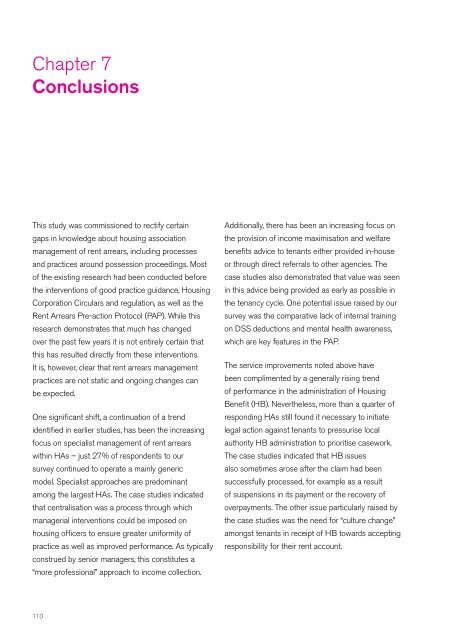Rent arrears management practices in the housing association sector
Rent arrears management practices in the housing association sector
Rent arrears management practices in the housing association sector
Create successful ePaper yourself
Turn your PDF publications into a flip-book with our unique Google optimized e-Paper software.
Chapter 7<br />
Conclusions<br />
This study was commissioned to rectify certa<strong>in</strong><br />
gaps <strong>in</strong> knowledge about hous<strong>in</strong>g <strong>association</strong><br />
<strong>management</strong> of rent <strong>arrears</strong>, <strong>in</strong>clud<strong>in</strong>g processes<br />
and <strong>practices</strong> around possession proceed<strong>in</strong>gs . Most<br />
of <strong>the</strong> exist<strong>in</strong>g research had been conducted before<br />
<strong>the</strong> <strong>in</strong>terventions of good practice guidance, Hous<strong>in</strong>g<br />
Corporation Circulars and regulation, as well as <strong>the</strong><br />
<strong>Rent</strong> Arrears Pre-action Protocol (PAP) . While this<br />
research demonstrates that much has changed<br />
over <strong>the</strong> past few years it is not entirely certa<strong>in</strong> that<br />
this has resulted directly from <strong>the</strong>se <strong>in</strong>terventions .<br />
It is, however, clear that rent <strong>arrears</strong> <strong>management</strong><br />
<strong>practices</strong> are not static and ongo<strong>in</strong>g changes can<br />
be expected .<br />
One significant shift, a cont<strong>in</strong>uation of a trend<br />
identified <strong>in</strong> earlier studies, has been <strong>the</strong> <strong>in</strong>creas<strong>in</strong>g<br />
focus on specialist <strong>management</strong> of rent <strong>arrears</strong><br />
with<strong>in</strong> HAs – just 27% of respondents to our<br />
survey cont<strong>in</strong>ued to operate a ma<strong>in</strong>ly generic<br />
model . Specialist approaches are predom<strong>in</strong>ant<br />
among <strong>the</strong> largest HAs . The case studies <strong>in</strong>dicated<br />
that centralisation was a process through which<br />
managerial <strong>in</strong>terventions could be imposed on<br />
hous<strong>in</strong>g officers to ensure greater uniformity of<br />
practice as well as improved performance . As typically<br />
construed by senior managers, this constitutes a<br />
“more professional” approach to <strong>in</strong>come collection .<br />
110<br />
Additionally, <strong>the</strong>re has been an <strong>in</strong>creas<strong>in</strong>g focus on<br />
<strong>the</strong> provision of <strong>in</strong>come maximisation and welfare<br />
benefits advice to tenants ei<strong>the</strong>r provided <strong>in</strong>-house<br />
or through direct referrals to o<strong>the</strong>r agencies . The<br />
case studies also demonstrated that value was seen<br />
<strong>in</strong> this advice be<strong>in</strong>g provided as early as possible <strong>in</strong><br />
<strong>the</strong> tenancy cycle . One potential issue raised by our<br />
survey was <strong>the</strong> comparative lack of <strong>in</strong>ternal tra<strong>in</strong><strong>in</strong>g<br />
on DSS deductions and mental health awareness,<br />
which are key features <strong>in</strong> <strong>the</strong> PAP .<br />
The service improvements noted above have<br />
been complimented by a generally ris<strong>in</strong>g trend<br />
of performance <strong>in</strong> <strong>the</strong> adm<strong>in</strong>istration of Hous<strong>in</strong>g<br />
Benefit (HB) . Never<strong>the</strong>less, more than a quarter of<br />
respond<strong>in</strong>g HAs still found it necessary to <strong>in</strong>itiate<br />
legal action aga<strong>in</strong>st tenants to pressurise local<br />
authority HB adm<strong>in</strong>istration to prioritise casework .<br />
The case studies <strong>in</strong>dicated that HB issues<br />
also sometimes arose after <strong>the</strong> claim had been<br />
successfully processed, for example as a result<br />
of suspensions <strong>in</strong> its payment or <strong>the</strong> recovery of<br />
overpayments . The o<strong>the</strong>r issue particularly raised by<br />
<strong>the</strong> case studies was <strong>the</strong> need for “culture change”<br />
amongst tenants <strong>in</strong> receipt of HB towards accept<strong>in</strong>g<br />
responsibility for <strong>the</strong>ir rent account .




